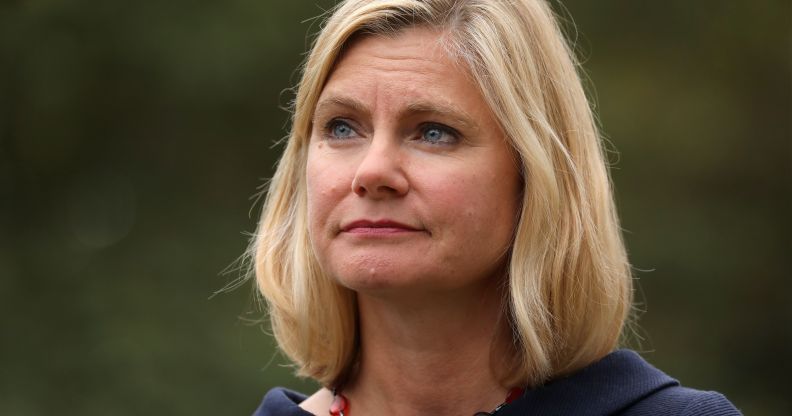There are more men named David running in the general election than there were LGBT+ MPs in the last two parliaments combined

Justine Greening, who was until recently one of Britain’s most senior LGBT+ MPs. (Getty)
More men named David are running in the 2019 general elections than there were LGBT+ MPs elected to the past two parliaments.
According to BBC analysis, there are 91 Davids running in the December 12 general election, as well as 73 Johns, 60 Jameses and 57 Pauls and 50 Marks. There are also 48 men named Chris and the same number of Andrews.
In comparison, 45 MPs who identified as queer were elected to parliament in 2017 – more than at any other election.
Two years earlier, in the 2015 general election, there were 32 openly LGB MPs returned to parliament.
Parliament has no trans representation
To date, Britain is yet to elect a trans MP to parliament.
Labour’s Sophie Cook came the closest to victory in the last election with 20,882 votes, cutting the majority of anti-LGBT Conservative Tim Loughton in half to just 5106.
Cook is running as an independent in the December election, along with at least six other non-binary and trans candidates.
Labour has one non-binary and one trans candidate, the Liberal Democrats are fielding two trans would-be MPs, and the Green Party has two non-binary people running.
Senior LGBT+ MPs stand down ahead of 2019 general election
Two of Britain’s most prominent LGBT+ MPs have stood down ahead of next month’s vote.
Sir Alan Duncan, the first openly gay Tory MP, said it was time to find “more fulfilling things” after 27 years in parliament.
Justine Greening, the first openly-lesbian cabinet minister and former equalities minister, said she was quitting politics because her “concerns about the Conservative party becoming the Brexit party have come to pass.”
Greening was one of 21 MPs who had the Conservative whip removed after rebelling against Boris Johnson’s Brexit plan.
Another former equalities minister, Amber Rudd, has also stood down. A further 16 women MPs have retired, with many citing abuse from the public as a contributing factor.

